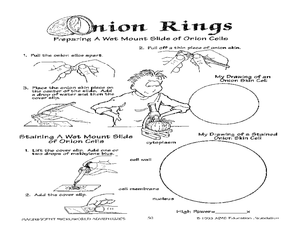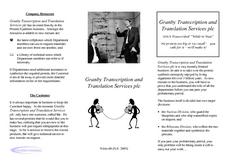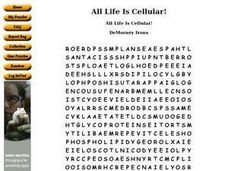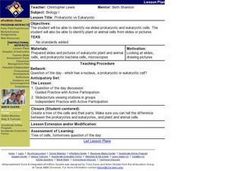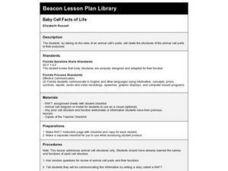Curated OER
Onion Cells
Students observe the cells of an onion by wet mounting it and viewing it in a microscope. In this hands on lesson students make their own wet mount slide of an onion and are able to identify the cells in it such as, the nucleus,...
Curated OER
Science: Atom Quiz
In this science: atom quiz worksheet, students answer 10 true or false questions, not interactively, then scroll down to check their answers.
Curated OER
Atomic Theory, Structure, and Symbols
For this atomic theory worksheet, students review the observations that led to the conclusion of the atom having a positively charged nucleus. Students compare atomic number and mass number and explain how the discovery of subatomic...
Curated OER
Quiz Questions - Cells
In this cells instructional activity, students read and choose the multiple choice answers to 20 questions involving cells, microscopes, and the life process of Growth.
Curated OER
Chemistry - Science 10
In this chemistry science worksheet, students identify the parts of a chemical reactions. Kids name the major particles of the atom. Students apply knowledge about the atom, theories, and models.
Curated OER
Energy and Atoms
In this atoms worksheet, students review atomic number and mass number of atoms plus what happens when an atom is radioactive. This worksheet has 8 fill in the blank and 9 short answer questions.
Curated OER
Energy and Atoms
In this atoms worksheet, students review atoms, atomic number, and mass number. Students determine what happens when atoms become radioactive. This worksheet has 8 fill in the blank and 9 short answer questions.
Curated OER
The Story of the Atom
In this atom instructional activity, students read about the model of the atom developed by Neils Bohr. Students complete 2 short answer questions based on what they read.
Curated OER
A View of the Cell
In this cell worksheet, students will match 13 vocabulary words relating to cells to the correct definition. The cell vocabulary words cover all the parts of the cell plus eukaryotes, and prokaryotes.
Curated OER
Why Do Atoms Combine?
In this atom worksheet, students will complete 8 fill in the blank statements based on the different parts of an atom. Then students will explain how the arrangement of electrons in an atom is related to the periodic table.
Curated OER
Periodically Puzzling
In this periodic table worksheet, students use the list of coded letters and clues that correspond to the represented elements in the first four periods of the periodic table to complete the chart at the bottom of the sheet. They...
Curated OER
Atomic Structure
In this atomic structure instructional activity, students explain that an atom is made up of protons, neutrons and electrons. Then they explain that the atomic number is equal to the number of protons and the mass number is equal to the...
Curated OER
Cells: The Units of Life
In this biology worksheet on cells, 9th graders name who the first person was to use the word cell and describe in what materials this person saw cells. Then they determine what instrument uses light and two or more lenses to view cells.
Curated OER
DNA Transcribed
In this DNA learning exercise, students describe how the cell stores all of the data needed to produce the required proteins for the body. Then they describe the ribosomes division and how is attaches itself to RNA and makes protein by...
Curated OER
All Life Is Cellular!
For this biology worksheet, students locate and identify each of the vocabulary terms relating to cells on the bottom of the sheet. There are 27 biology terms to locate in the word search.
Curated OER
Cell Structure And Function
In this biology worksheet, students respond to 13 multiple choice questions related to cell structure and function. They identify which are microfilamets and which have a cell wall. Students also describe what chloroplasts are and their...
Curated OER
Prokaryotic vs Eukaryotic
Young scholars identify via slides prokaryotic and eukaryotic cells. They identify plant or animal cells from slides or pictures. Students are given the question of the day. They are asked which has a nucleus, a prokaryotic or...
Curated OER
The Microscopic World
Students identify magnification by first using a magnifying glass and then with photos taken through a microscope. They complete a handout that leads them through each activity stated. Finally, students use their microscope to view a...
Curated OER
Biology: Make a Model Cell
Students compare and contrast plant and animal cells and then create a model of the latter. They visit Websites to view the cells and answer questions about them. In pairs, students create cell models using plastic baggies, syrup,...
Curated OER
Building a Clay Neuron
Young scholars investigate and then build neurons in this lesson. They are examined as key parts of the brain and nervous system and seen as different from normal cells.
Curated OER
Cell Structures and Functions
Fifth graders search into animal and cell characteristics and their functions in this seven lesson unit. Replicas of the cell are constructed out of Jell-O as students probe the internet for details of the concepts.
Curated OER
Atomic Structure: The Heart of Matter
Learners study the particles of which atoms are made. They define the electron, proton, and neutron and their attributes.
Curated OER
Baby Cell Facts of Life
Students examine the roles of an animal cell's parts, how each part relates to one another and then demonstrate their knowledge by writing a story about the animal cell structure.
Curated OER
WHAT IS A CELL?
Students explore the function and structures of cells, including plant and animal cells. They explore cell parts including cell wall, ribosomes, chromosomes, nucleoid, plasmids, flagella, pilli, and plasma membrane, cel


